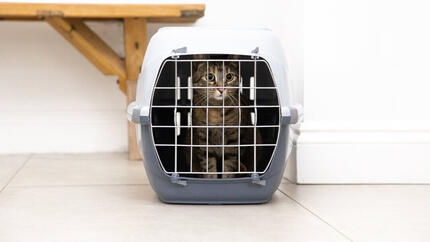
If you’ve got a feline friend, or you’re thinking of getting one, you may be wondering how long do cats live? Domesticated cats can live long lives, but their life span is dependent on many different factors.
For example, a cat’s breed and whether they’re indoor or outdoor can impact a cat’s life expectancy. It’s also affected by their lifestyle and what they eat and how much they exercise can make a huge difference.
Thanks to continuing advances in veterinary medicine and science, cat life expectancy has increased and so our cats can hopefully stay healthy and happy for longer. Read on to find out how long indoor and outdoor cats can live, how long certain breeds may live and how to maintain or increase your cat’s life expectancy.
How long do cats live?
On average, pet cats in the UK live to around 14 years – although some domestic cats can live to 20 years old (with the world’s) oldest cat living to 26! This average age is the equivalent of 72 in human years, using our cat to human years calculator! But of course, this feline life expectancy depends on a few factors which we’ve detailed below.
How long do outdoor cats live?
Outdoor cats love to explore and get into everything. Unfortunately, this does come with risks. According to several studies, outdoor cats who are unsupervised majority of the time, have a life expectancy of around seven years although it depends on their home environment and its hazards – with urban cats often having shorter lives.
Outdoor cats are more likely to get stolen, lost, get run over, eat something they’re not supposed to (like poisonous plants) and get into fights with other cats. To reduce these risks, try to keep your adventurous feline indoors at higher risk times, such as after dark and consider building an outdoor area for them in the garden (catios) where they can still enjoy the great outdoors but are still secure and so safe.
How long do cats live indoors?
Indoor cats spend most of their lives inside our homes. An indoor lifestyle may suit some cats and knowing that they are warm, comfortable and safe, can be reassuring for owners. Indoor cats encounter fewer hazards than their outdoor friends, with no cars to contend with, no territory to fight over and fewer other risks too. Because of this, it’s thought that cats that are kept inside, live longer. So, on average, how long do cats live indoors? Well, estimates vary, but many vets say that indoor cats have a life expectancy of 14 years+ depending on breed and type.
Owners of some cat breeds, like Bengals for example, feel that they are better suited to an indoor lifestyle – and of course many of the glamorous breeds are a huge theft risk if allowed to wander out and about.. Some indoor cats can go outside under supervision, in an enclosed garden with their owner close by or even in a ‘catio’, a specially designed run for indoor cats to get a taste of the outdoors.
How long do tabby cats live?
A cat’s life expectancy can depend on breed. Domestic shorthair tabby cats are popular felines, so how long do tabby cats live? The average life expectancy of a tabby cat is between 12 and 15 years, but some can live until they are 18 or older.
Other cat breed life expectancies
Some studies have found different results. According to Vets Now, crossbreed cats had an average life expectancy of 14. They also found that purebred cats had a slightly lower lifespan of 12.5 years, which may be attributed to an increased risk of hereditary illnesses.
How to increase your cat’s life expectancy
Now that we know how long cats live, you’re probably wondering if there’s any way to increase their time with us.. Of course, we want our furry friends to live as long as possible. With the right love and care, you can increase your cat’s chance of living their life to the fullest. Here are some ways to help maintain or increase your cat’s life expectancy:
- Vaccinations – getting your cat protected from diseases can prevent illnesses
- Vet checks – we all need a check-up every so often and the same goes for your cat
- A healthy diet – a balanced diet keeps your cat fit and healthy
- Keeping them warm and safe indoors at night
- Microchipping – in case your feline gets lost, microchipping them increases your chances of being reunited
- Exercise – keeping them fit and healthy is highly beneficial
- Environmental enrichment – cats need an opportunity to be able to climb, jump, chase, hunt, and pounce in order to be healthy and happy. They also need to feel safe and secure – so have easy access to food, water and litter trays (if used) without competition or stress.
Finding out how long cats live is great for learning more about our feline friends. If you’re looking to get a cat, find out all you need to know with our article on what your new cat needs.










